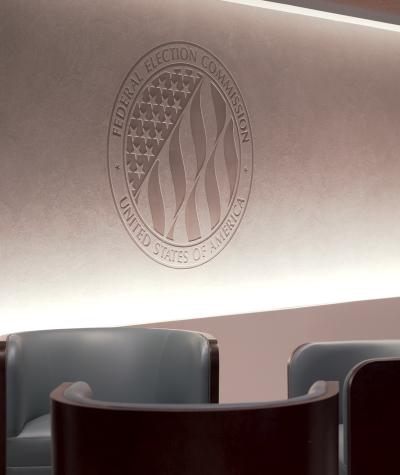Transparency and accountability are fundamental values that promote democracy. Voters have a right to know who is spending money in our elections and influencing politicians, and this information is critical to hold government officials accountable and make informed choices about who should represent them in government.
The Federal Election Commission (FEC) is an independent agency charged with enforcing the campaign finance laws that maintain these important values.
It has been 50 years since Congress created the FEC. For decades, the agency helped foster transparency and curtail corruption. Yet in recent years, the FEC has largely failed to fulfill its mission of properly interpreting and enforcing federal campaign finance laws.
A well-functioning, independent FEC is essential for keeping our democracy in the hands of the people — which is why Campaign Legal Center (CLC) has long advocated for FEC reform.
The History of the FEC
Following public revelations of campaign finance abuse and corruption stemming from the Watergate scandal, Congress created the FEC in 1975 to implement and enforce the Federal Election Campaign Act (FECA).
This new agency was intended to ensure the public had access to information about the money raised and spent to influence federal elections.
Congress explicitly, and intentionally, created the FEC to be an independent, bipartisan federal agency whose commissioners are appointed by the president and confirmed by the U.S. Senate.
Of the six commissioners, no more than three can represent the same political party, and four votes are required for the commission to take any official action.
And because the FEC has the authority and responsibility to regulate the president and presidential campaigns, Congress set up the FEC as an independent federal agency.
For many years, the FEC successfully issued rulings that increased transparency for voters, made candidates and campaigns more accountable, and implemented several laws to regulate contributions in federal elections. But recently, the commission has been plagued by challenges.
The Rise of Deadlock and Deregulation
So why has the FEC failed, in recent years, to protect our federal elections from outside influence and corruption?
Starting in the mid-2000s, members of Congress who oppose transparency and want unlimited secret spending in our elections have worked to ensure that at least three commission seats are occupied by people who are fundamentally opposed to the FEC’s mission of regulating money in federal elections.
As a result, the commission would routinely deadlock, usually voting 3-3 along party lines, on important campaign finance issues.
Because four votes are required for any official commission action, this deadlock led to the commission failing to enforce the law in many cases involving blatant campaign finance violations, refusing to investigate, and failing to implement new laws that would further protect our elections from outside influence.
More recently, inaction due to deadlocks has given way to a far more problematic trend: a proactive dismantling of the campaign finance laws the agency is supposed to uphold.
In the past two years, a bloc of four commissioners has repeatedly rolled back regulations on election spending while declining to investigate clear violations of the law.
CLC issued an investigative report shining light on how the FEC’s dangerous new path is weakening democracy by undermining transparency and enabling more outsized influence for wealthy special interests than ever before.
The Dire State of Money in Elections
Primarily as a result of the U.S. Supreme Court’s decision in Citizens United v. FEC, our elections seem more subject to the influence of wealthy special interests than ever before.
Not only did Citizens United usher in an astronomical influx of money in our elections, but much of that spending is also not disclosed to the public and is openly coordinated with candidates and political party leaders.
This is largely thanks to the FEC’s troubling trend of consistently and deliberately undercutting legal safeguards and failing to investigate obvious violations of campaign finance law.
Secret spending (or “dark money”) dominated the 2024 election cycle: Billions were pumped into federal elections to sway voters across the country.
The FEC cleared the way for federal candidates to coordinate with supportive super PACs on paid coordinated canvassing activities — with workers going door-to-door to influence voters and hand out literature.
This opening allowed billionaire megadonor Elon Musk to spend millions of dollars in coordination with Donald Trump’s presidential campaign.
Both the Supreme Court and the FEC have helped facilitate billionaires emerging as an increasingly important funding mechanism for those pursuing federal office.
President Trump courted several throughout his campaign, including Musk, who spent $300 million to get him elected and was then given a powerful position in the administration — one that lets him line his own pockets.
The Current Threat to the FEC’s Independence
The FEC has faced challenges for much of its existence — but the current attacks on the commission’s independence threaten to completely upend its ability to keep election spending and corruption in check.
President Trump is attempting to control agencies that, by law, must operate independently, issuing an executive order in February 2025 that purports to undermine their autonomy.
While Trump does not have the legal authority to do so, his executive order appears to assert direct control over the FEC. He also “fired” FEC Chair Ellen Weintraub, a Democrat, which the president has no authority to do.
Congress specifically insulated the FEC from the White House to ensure it could focus on their mission regardless of the political whims of the president.
This is particularly important when an agency’s mission involves regulating those seeking and serving in the office of president.
As CLC made clear in a public letter to the FEC, unlike most other federal agencies, the FEC is responsible for enforcing the law against the president as both a candidate and as a holder of federal office.
Giving the president power over the FEC would be disastrous for our elections. FEC commissioners must be able to properly enforce campaign finance laws against any candidate for federal office, regardless of the political or policy choices of the president.
That’s how Congress set up the agency, and how it has to function.
CLC filed a legal brief in Democratic National Committee v. Donald Trump supporting the Democratic National Committee’s (DNC) challenge to the constitutionality of President Trump’s attempt to seize control of independent agencies such as the FEC.
The Future of the FEC
The FEC was created 50 years ago to serve a vital purpose: ensuring that those seeking and holding power are held accountable to the voters.
With your support, CLC will continue advocating for the FEC’s independence, as well as urging reforms that will help it fulfill its important mission and purpose.



